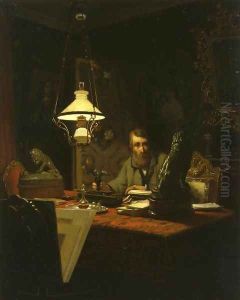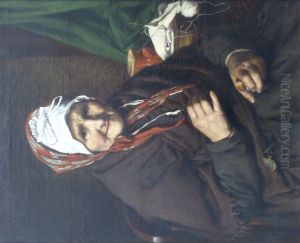Edouard-Antoine Marsal Paintings
Édouard-Antoine Marsal was a French painter born on July 28, 1845, in Montpellier, France. He is known for his historical scenes, genre paintings, and portraits. Marsal studied at the École des Beaux-Arts in Paris, which is one of the most influential art colleges in France. He was a student of Alexandre Cabanel, a prominent French painter who was known for his traditional academic style and his work as a teacher to many important artists.
Marsal exhibited his work at the Paris Salon, an annual art event that was the official art exhibition of the Académie des Beaux-Arts in Paris. The Salon was the most prestigious place for artists to exhibit their work in the 19th century. Marsal achieved recognition for his work early on, receiving a third-class medal at the Salon in 1874, which helped to establish his reputation.
Throughout his career, Marsal continued to paint in a style that was consistent with the academic tradition, focusing on well-crafted, realistic images. He was particularly known for his ability to depict light and shadow, creating atmospheric effects in his works. His paintings often featured historical or mythological themes, which were popular among the academic artists of the time.
Marsal's work reflects the tastes and values of the Third Republic in France, a period marked by a sense of national pride and a desire to affirm French cultural identity through the arts. His historical paintings can be seen as part of this broader movement, as they often depict moments from French history with a sense of grandeur and drama.
Édouard-Antoine Marsal passed away on May 10, 1929, in Paris. His paintings can be found in various museums and collections, serving as examples of the academic art tradition of the late 19th and early 20th centuries. Marsal's legacy is that of a skilled painter who contributed to the preservation and celebration of French history and culture through his art.

